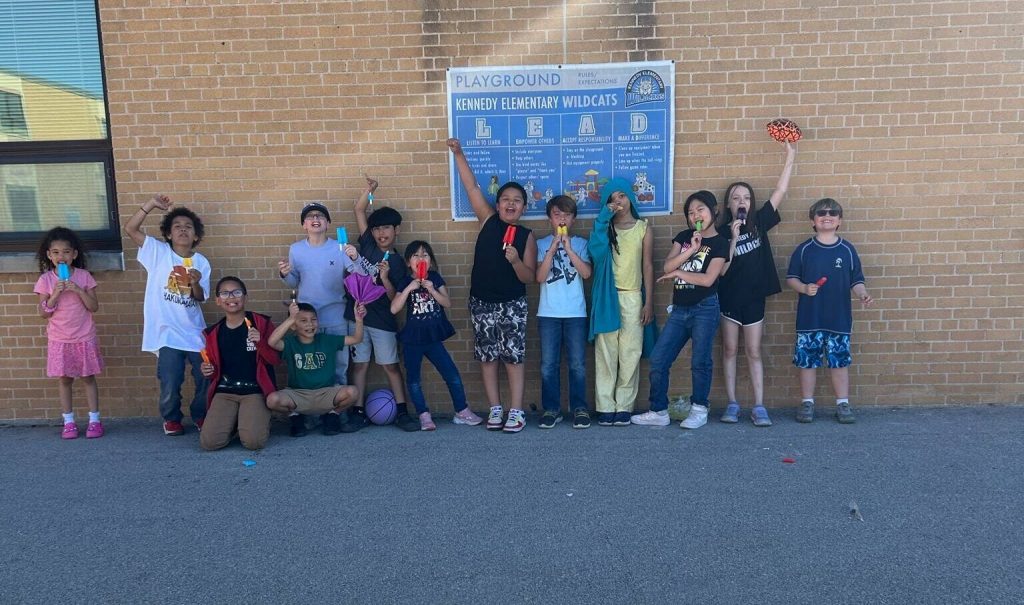Trump Budget Would Ax Funds for State’s After-School Learning Centers
They serve 20,000 students at 168 sites in high-poverty districts across Wisconsin.

Students with the community learning center at Kennedy Elementary School in Green Bay pose outside. Photo courtesy the Green Bay Area School District
A program supporting Wisconsin children for the last two decades is at risk of losing dedicated federal funding.
Community learning centers served 20,000 students at 168 sites across the state last school year. The federal program is designed to support students at high-poverty schools through before- and after-school programs that offer academic and social programs and provide free meals to help students who might suffer food insecurity.
Since 2002, the program has been mostly funded through the federal Nita M. Lowey 21st Century Community Learning Center grant. Last year, the state Department of Public Instruction received $19 million to fund the program.
But President Donald Trump’s budget proposal would eliminate the grant, which is the only federal funding stream dedicated to after-school and summer learning.
Eliminating the grant is part of a proposed $12 billion in cuts to the U.S. Department of Education that would begin Oct. 1. It amounts to a 15 percent cut to the agency’s budget. According to budget documents, the plan fulfills Trump’s “commitments to maintain funding to school districts serving children from low-income families,” but also “reflects an agency that is responsibly winding down.” Trump campaigned on promises to eliminate the federal Department of Education.
But in Wisconsin, where more than 600,000 students have been served by community learning centers over the last two decades, school leaders say families will be hurt if the grant is cut and local funds can’t make up the difference.
“When we talk about the proposed impact that the loss of 21st Century CLC funds would have, the numbers speak for themselves,” said Leighton Cooper, a recreation coordinator with the Milwaukee Recreation Department who oversees community learning centers.
The recreation department is part of Milwaukee Public Schools and serves more than 5,000 students at 36 centers across the city.
Those students would no longer have access to meals, recreation or academic enrichment, Cooper said.
“There’s more of a need across the community now,” Cooper said. “Young people are engaging in risky behaviors. These programs help to provide an alternative to ensure young people are safe.”
The federal grant is awarded on a five-year basis. In Milwaukee, Cooper said if the Trump budget passes, the centers would not immediately close.
“No one is really certain what may happen,” Cooper said. “We’re taking steps to plan in the event that funds may not exist in the long term.”
That’s what is happening in Green Bay, too, where Amy Fish, the associate director of community partnerships and grants for the Green Bay Area Public School District, said she doesn’t want to alarm families.
There are more than 800 students enrolled in community centers at 11 sites in Green Bay. Those centers are dependent on $600,000 in federal funding, which Fish said can’t be replaced by local dollars.
“This is a difficult spot to be in because we don’t want to scare families, and this has been an administration that’s making decisions and then those decisions don’t come to fruition,” Fish said. “In the meantime, we’re taking a look at really understanding where is our need, what components of our program have the greatest impact, and just start looking at different options for sustainability.”
Eileen Otis, who oversees the community learning programs in Madison, said her district gets just over $1 million for 11 elementary and high school sites.
Like Green Bay and Milwaukee, Otis is waiting to see what options will be available to continue serving Madison students if federal funding is cut.
State Superintendent Jill Underly released a statement saying the academic and social benefits provided by out-of-school time programs work.
“Community learning sites are an example of the positive impact that collaboration between families, schools, and community organizations can have on the care and development of kids,” Underly said.
The state Department of Public Instruction released a statewide report on community learning centers that shows 62 percent of students in the programs improved school-day attendance; 50 percent of middle and high school students raised their GPA and 63 percent of participants showed increases in classroom engagement.
Trump budget would eliminate funding for Wisconsin after-school learning centers was originally published by Wisconsin Public Radio.
If you think stories like this are important, become a member of Urban Milwaukee and help support real, independent journalism. Plus you get some cool added benefits.





















Voters–it is way past time for you to vote all of our elected officials OUT OF OFFICE who support Donald Trump’s destructive policies. Stop hurting children and families!
As with most all cuts for any Federal Department that Trump is making from health research to educational programs, the effectiveness and impact are never looked at. It’s always the mantra of “waste, fraud, and abuse” without any documentation.
We either invest in our children now or we experience more crime and poverty later. Seems like a no-brainer but nothing but killing government makes sense to Trump.
You want kids off the streets from causing trouble?
Fund ALL of these programs.
But the police state and for profit prison types sure don’t like the sound of that.